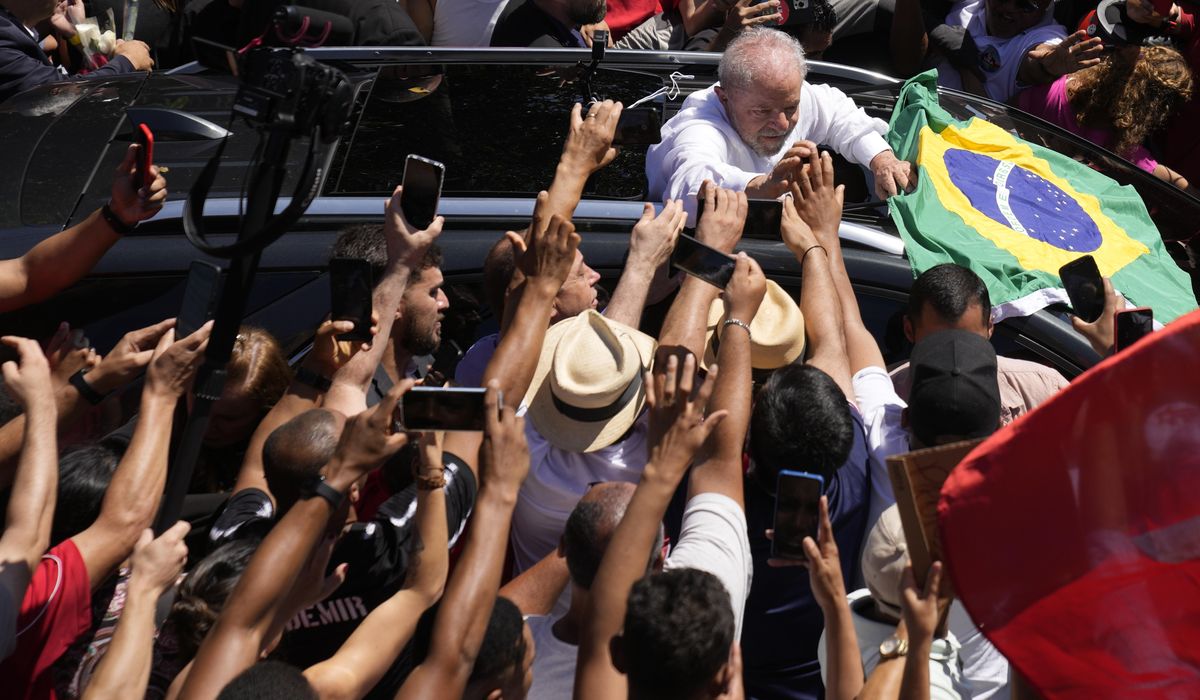
With Chinese investment in Brazil dramatically outstripping that of the U.S. in recent years, Chinese President Xi Jinping congratulated leftist icon Luiz Inacio Lula da Silva on Monday. Mr. da Silva beat Mr. Bolsonaro by roughly just under two percentage points in Sunday’s run-off vote, according to official tallies.
“I attach great importance to the development of China-Brazil relations,” Mr. Xi said in a statement calling for “a new level” of “comprehensive strategic partnership between China and Brazil.”
The Chinese president’s comments came hours after President Biden had also rushed to congratulate Mr. da Silva, whose win marks an about-face for Brazil after four years of populist, far-right policies under Mr. Bolsonaro, who nearly came back to win a second term in the extremely tight contest.
While Mr. Biden emphasized that the election was “free, fair and credible,” fears are mounting that Mr. Bolsonaro may refuse the result and spark demonstrations that could violently divide Brazil — the top U.S. trade partner in South America and the Western Hemisphere’s second most powerful economy.
Mr. Bolsonaro, often dubbed the “Trump of the tropics,” consistently trailed in polls to Mr. da Silva and ahead of Sunday’s vote, he made repeated — albeit unproven — claims of possible electoral manipulation, raising fears that his supporters would not accept defeat and would challenge the results if he lost.
Mr. da Silva, who was previously president from 2003 to 2010, held a 50.9% to 49.1% lead after 99.9% of the votes were counted Sunday night, according to Brazilian election officials, who said the count meant it would be mathematically impossible for Mr. Bolsonaro to be declared winner.
Sen. Flavio Bolsonaro, who served as a coordinator on his father’s campaign, thanked supporters Monday and told them to keep their heads up and “don’t give up on Brazil.” Several top Bolsonaro associates said they accepted the narrow defeat, and Mr. Bolsonaro’s movement will retain considerable influence with gains among key state governorships and in the national legislature.
Mr. Bolsonaro, 67, countered by repeatedly referring to Mr. da Silva, 77, as an “ex-convict,” drawing attention to the 19 months the former president spent in prison in 2018 and 2019 for corruption and money laundering tied to sprawling scandals during his time in office.
Mr. da Silva’s early-2000s economic growth and anti-poverty initiatives were popular in Brazil, which funded the programs with profits from an unexpected fossil fuel boom after the 2007 discovery of the massive Tupi oil field off the country’s coast.
Brazil is now one of the top 10 suppliers of oil to China, which has spent the past decade expanding its investments in the South American country.
The China-Brazil business council has claimed Chinese companies invested some $5.9 billion in Brazil in 2021, more than three times the roughly $1.9 billion Chinese companies reported spending in the country in 2020, according to the Chile-based economic analytics firm BNamericas.
The Chinese investment still pales in comparison to the total $108 billion in foreign direct investment stocks in Brazil held by U.S. companies. However, China’s overall trade is growing with Brazil and other South American countries.
A February report by Bloomberg maintained that China has bought up so much copper, pork, and soy — and constructed so many roads, trains, power grids and bridges — on the continent that it has surpassed the U.S. as South America’s largest trade partner and is now the single biggest trader with Brazil, Chile, and Peru.
The Hong Kong-based South China Morning Post (SCMP) reported Monday that trade between China and Brazil hit a record $135 billion in 2021, marking four consecutive years of growth despite the COVID-19 pandemic.
A new partner in Brasilia?
“In 2004, Lula drew closer to Beijing, leading a delegation of more than 450 business leaders to China to lay the foundations for a partnership that intertwined the economies of both countries,” the SCMP added, noting that “during Lula’s presidency, he met former Chinese President Hu Jintao eight times.”
Where Mr. da Silva intends to take the relationship upon his return to the presidency remains to be seen, amid high inflation in Brazil and a forecast of slowing economic growth on the near horizon.
Shoring up domestic political divisions may also factor into Mr. da Silva’s foreign policy. Thus far, he is promising to govern beyond his party, saying he seeks to bring in centrists and even some leaning to the right who voted for him for the first time, and to restore the country’s more prosperous past.
The highly polarized election, meanwhile, extends a wave of recent leftist victories in the region, including Chile, Colombia, Peru and Argentina. One complaint frequently voiced by Bolsonaro partisans was that a da Silva administration would turn the country inton “another Venezuela,” — the socialist regime that has overseen a major economic and humanitarian catastrophe.
Thomas Traumann, an independent political analyst, compared the results to Joe Biden’s 2020 victory over President Trump, saying Mr. da Silva is inheriting an extremely divided nation.
“The huge challenge that Lula has will be to pacify the country,” Mr. Traumann told The Associated Press. “People are not only polarized on political matters, but also have different values, identity and opinions. What’s more, they don’t care what the other side’s values, identities and opinions are.”
• This article is based in part on wire service reports.
